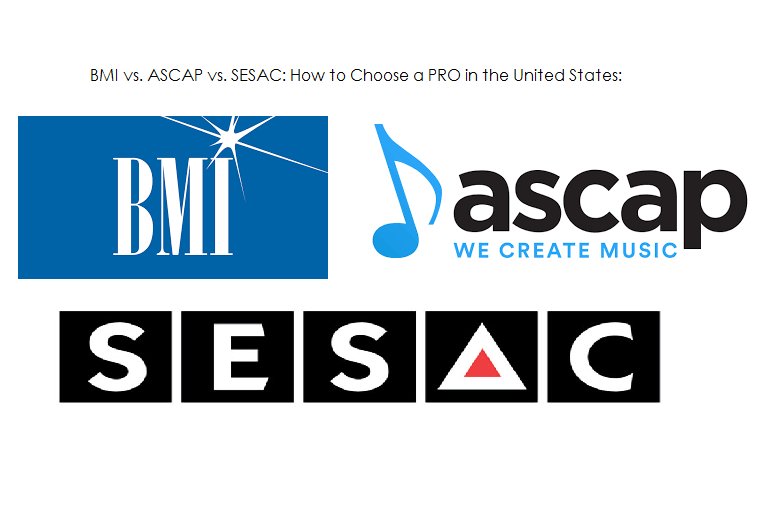by Scott Ashley

Here is an essential guide to Performing Rights Organizations (PROs) and why every songwriter or composer should join one sooner than later (if you haven’t).
For songwriters, if their songs are being played on radio, department stores, venues, etc. Performance Rights Organizations (PROs) help you collect royalties from any business, entity, or establishment that plays their music publicly. By joining a PRO group like BMI, ASCAP, or SESAC, you give them the right to track and retrieve this money on your behalf. If you have any music that’s available to the public, a PRO can make sure you’re receiving everything you’re owed.
However, the business playing your music isn’t simply doing you a favor. They rely heavily on tunes from talented artists like yourself to convey their identity and create an ambiance that keeps customers coming back. The average store is open for sixty-six hours a week. Considering the average song lasts three minutes and 30 seconds, most stores will play around 1,500 songs a week.
What Performance Royalties Are Not
Performance royalties are easily confused with other kinds. Becoming familiar with the following music usages and their key differences can help you get the most out of your relationship with your PRO.
Performance royalties are not mechanical royalties, which you’re owed whenever your music is pressed onto a physical object like a CD, DVD, or a vinyl record. Also, read this related article - 4 Types of Royalties Involved in Music Publishing: https://www.songwriting.net/blog/4-types-of-royalties-involved-in-music-publishing
Performance royalties are not synchronization (or sync), which occurs whenever your song is on the soundtrack of a film, TV show, or any performance with a script.
Performance royalties are not digital royalties, which you receive when web radio providers like Spotify, Pandora and Sirius XM stream your music for the public.
ASCAP, BMI, and SESAC are the most famous of the American PROs.
BMI
BMI is the largest PRO with 800,000 members and a catalog of 13 million titles. As a non-profit launched by record executives in 1939, it prides itself as an “advocate for the value of music.” Anyone can join—with free membership for writers and membership fees of $150 – $250 for publishers. A contract with BMI lasts two years for writers and five years for publishers. In addition to hosting events, BMI maintains stages at several major festivals like Lollapalooza and Austin City Limits, and offers discounts for the billboard touring conference and the Songwriters Hall of Fame. BMI counts artists Lil Wayne, Lady Gaga, and Maroon 5 amongst its roster. BMI was sold New Mountain Capital (private equity group) in 2023. For additional information, go to: www.bmi.com
ASCAP
The other half of the big two, ASCAP is run solely by composers, writers, and music publishers. It’s slightly smaller than BMI with around 650,000 members and around 12 million songs in their catalog. Writers and publishers alike can pay a $50 fee to join or $100 to register as both. Perhaps its most appealing feature is that ASCAP’s contracts only last one year, after which you can renew or switch organizations. Along with its own event programming, ASCAP offers members discounts on health, dental, and life insurance. They boast Kendrick Lamar, Justin Timberlake, and Beyoncé as members. As of January 2024, ASCAP is the only PRO has not been sold to a private equity group. For additional information, go to: www.ascap.com
SESAC
As far as PROs are concerned, SESAC takes a divergent path. Unlike BMI or ASCAP, SESAC is a for-profit organization and exclusively invite-only. With a membership of just 60,000 and only 340,000 songs under its belt, they can afford to be far more hands-on with its artists. They offer members a range of discounts on magazines, cellphones, and music gear, as well as hosting its own set of networking events. Adele, Bob Dylan, and Mariah Carey are all SESAC members. SESAC was sold to the Blackstone group (private equity group) in 2017. For additional information, go to: www.sesac.com
Also, read this related article - How to copyright your songs online in 6 easy steps: https://www.songwriting.net/blog/how-to-copyright-your-songs-online
WHICH PRO IS FOR YOU?
Depending on what an artist needs from their Performing Rights Organization, any of the "Big Three" are great options.
The costs are largely the same (keep in mind that in addition to membership fees, all PROs also take an estimated 11-13% fee from collected royalties to cover administrative costs and expenses). So it usually comes down to side benefits, customer service, and personal preference.
Once you choose a PRO and begin collecting quarterly public performance royalty checks, contact us to learn how to maximize their potential.
If you are not in United States, there are PROs in your country, example: SOCAN (in Canada), PRS (in UK), GEMA (Germany), APRA (Australia), SAMRO (South Africa), JASRAC (Japan), SADAIC (Argentina) and many more.
ABOUT THE AUTHOR
Scott Ashley is a songwriter and graduate of the prestigious Berklee College of Music in Boston. He is a voting member of the Recording Academy (National Academy of Recording Arts and Sciences). He is currently working as the Artist Relations director with the USA Songwriting Competition and IAMA (International Acoustic Music Awards). His book "How to Write Better Songs" hit #1 on the Amazon Best Seller Books Charts last year. Click here to purchase Scott Ashley's book on Amazon: https://www.amazon.com/dp/B0B5PLFGKX
For information on the 29th Annual USA Songwriting Competition, go to: https://www.songwriting.net


